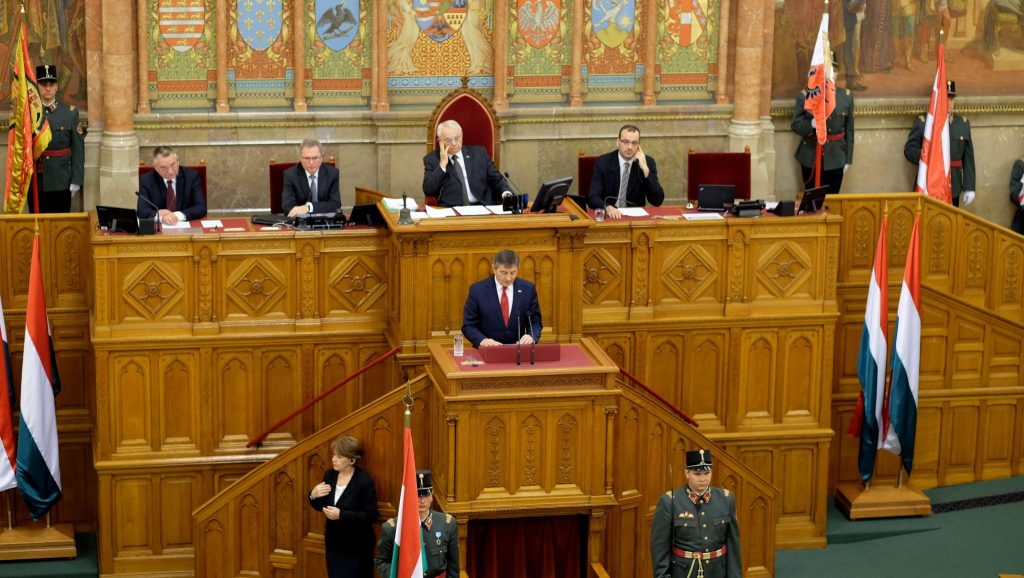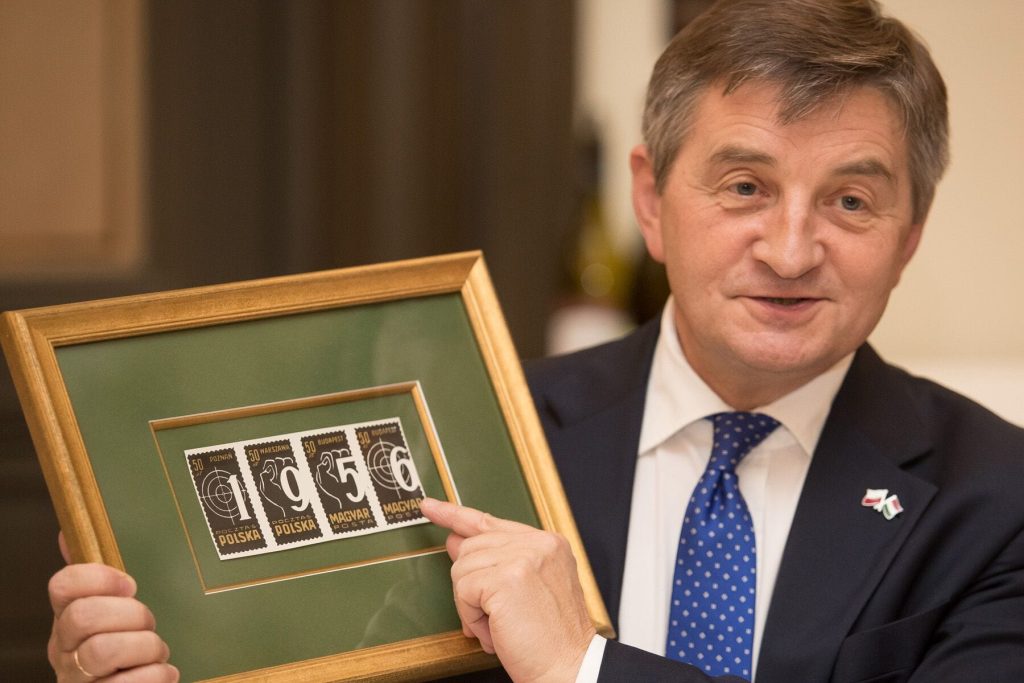True values are universal, they do not age, they are not subject to momentary trends. Countries, nations, communities should be guided by fixed values. One of them is identity. Poland has been building its independence on it for centuries. Identity allows us to be different in diversity.
Five years ago, on the occasion of the 60th anniversary of the Hungarian Revolution of 1956, I had the honor of giving a speech at the Hungarian National Assembly in Budapest. I would not recall it today were it not for the backstage conversations I had afterwards. Already five years ago, we talked about how our cooperation could still be a good example for other countries in the European Union today.
For centuries, Poland and Hungary have been able to talk to each other, respect their differences, sometimes play the same piano, sometimes several different ones. We understand that we should talk about common interests and pursue common goals, but at the same time we respect the fact that sometimes our paths are different, we have different views on many issues and we do not force each other to adopt the same solution.
Our common history has taught us this: we have observed which economic models and legislative solutions are beneficial for the country in the long run. Sometimes what today seems to be marching against the wind, after some time turns out to be the best path for others. However, we have the right, and even the duty to our own citizens, to follow the choices of our consciences, shaped by universal values and individual experiences.
In recent years Poland and Hungary have become real partners, not only creating their own policies, but also influencing events across Europe. The common voice of Poland and Hungary, as well as of the entire Visegrad Group, has started to sound louder, making it easier to convince the European Union of our values and vision.
That is why I am taking the liberty of recalling that speech today, because it seems to me that it is still relevant, despite the passage of time. And also because of the words I heard five years ago in Hungary: "Please recall your words in a few years. Let us see if they are still relevant. For only then will they be true.

Dear Mr. President of the National Assembly of Hungary,
Dear Mr. President of the Federal Council of Germany,
Honourable Members,
Excellencies, Eminences,
Ladies and Gentlemen
It is my great honor and privilege to speak at the seat of the Hungarian Parliament, on this historically special day - the 60th anniversary of the Hungarian national uprising, on behalf of my approximately 60 million compatriots living in Poland and abroad.
Thank you for the invitation and the opportunity to speak as a representative of the Sejm of the Republic of Poland and the Polish people.
I am aware of the unique significance of this moment. Hungary is one of the homelands of modern European democracy and parliamentarianism, as is Poland. A visible confirmation of this is the Hungarian Parliament building, a building which captivates not only by its beauty, but by its strong historical roots in the traditions and history of Hungarians. For this reason, for more than a century, it has become a symbol of the connection between Hungary's greatness and the institution of the parliament.
Our homelands experienced their greatest flourishing precisely under conditions of parliamentarism. It was at the Polish and Hungarian Sejms that patriotic attitudes, understanding of the reason of state, legal culture and responsibility for the state were formed.
While absolutism was being established in Europe - both Western and Eastern - our ancestors in Hungary and Poland practiced democracy. This democracy was accompanied by unprecedented economic development. We are proud of our past, it is the foundation of the historical politics of today's Poland and Hungary.
Both the Kingdom of Poland and the Kingdom of Hungary created in the Middle Ages a unique model of state, based on cooperation of all states and tolerance of various religions. Our ancestors were able to meet the challenges of those times.
A unique feature of the Hungarian and Polish fates is their mutual intertwining and historical convergence. I would see the reasons for this phenomenon in the cultivation of similar values, derived from Christianity, and in the attitude towards one's own country, based on the obligation to serve the homeland.
For us equality, freedom and brotherhood are not just political slogans but necessary and universal features of political life. That is why Poles and Hungarians in the 19th century became fighters for our freedom and yours. This same motto was also inscribed on their banners in 1956, when they fought against the "evil empire" of the Soviet Union and against communism, which contradicted European values and threatened the nations of Central Europe.
The 1956 Polish-Hungarian Solidarity cannot be understood without the past. I will refer to three symbols.
First - at the same historical time - at the end of the 10th century, Poles and Hungarians not only adopted Christianity in the Latin rite, but also built their own states here in Central Europe, giving it its most important political and cultural characteristics. The main centers of political and religious culture in this part of Europe are of Polish or Hungarian origin.
Second - of the six royal coats of arms hanging in the main halls of the Hungarian Parliament (also in this room), five of them indicate common monarchs and dynastic ties. Today we would say that Poland and Hungary formed a political and military alliance for much of their history. It was confirmed by the battles of Varna and Mohacz, mutual help in national uprisings in the 19th century and during both world wars.
Thirdly, in important and usually difficult situations Poles and Hungarians appealed to God's providence and put their trust in it. Since 1823 in the anthem of Hungary we sing: "God save the Hungarians and grant them your graces!" A few years earlier in 1816, the Polish national song included the words: "God! Thou hast surrounded Poland for so many centuries with the splendor of power and glory". For several centuries Poland and Hungary became the bulwark of Christianity and protection for Europe.
Poland and the Polish nation will always remain grateful to Hungary for the help that Poles, including Polish citizens of Jewish origin, received in Hungary during World War II. The emotional connection between our nations survived the difficult times of World War II.
Whatever our differences, our fate after World War II was identical. We were behind the "Iron Curtain". In 1956 Poles and Hungarians again reached out for the deed of independence and in mutual solidarity took up the struggle for the state, values and democracy. The undisputed statesmen of those times, the 'kings without crowns' were the Primates Stefan Wyszyński of Poland and Jozef Mindszenty of Hungary. They were the ones who showed that there was no independence and democracy without values, and that collaboration with the occupant was not compatible with the raison d'état of Poland and Hungary and had its deep historical justification. They gave our resistance an almost missionary dimension.
We are grateful for the Hungarian memory of Poles' solidarity in 1956. It was shown in the form of humanitarian transports and blood deliveries to the fighting insurgents, which is so beautifully commemorated by the plaque unveiled a few days ago on Józef Bem Square in Budapest.
I am Polish, therefore I am European. You are European because you are Hungarian. This order, this cause-and-effect relationship will continue to be valid in the future, because Europe is populated by nations, not by a European people with uniform ethnic and cultural characteristics.
Both Poles and Hungarians also have a Central European identity. This identity depends neither on the borders of the region nor on the search for its center or most important monuments. The most important thing is the awareness of being a resident of Central Europe and identifying with its history.
The motto of the European Union "united in diversity" is well understood in Central Europe. It is diversity that has been the strength of our region, determining culture, social life and economy for centuries. Diversity also gave strength to Poland and Hungary. In Central Europe the principle of "divide and rule" was rejected, and another motto replaced it: "nothing about us without us".
We consistently reject the policy of unifying the European nations. It is reminiscent of practices applied in not so distant times. The Polish-Hungarian history proves that it is possible to be friends while preserving one's differences, living in sovereign and strong states, practicing the native variant of democracy.
Having lost our own states in the past, after two world wars and after the Cold War in Poland and Hungary, we know the price of freedom. We also know that a lack of reforms or reforms carried out too late inevitably leads to failure and defeat. For this reason we are in favor of a quick renewal of the European Union, remembering well the collapse of the Polish-Lithuanian and Hungarian-Austrian unions.
Dear Sirs,
Dear Hungarian Friends,
Hello! - This is how our ancestors greeted each other in Poland and Hungary for centuries.
Hello! - I, too, say hello to the Hungarian students present in this hall who took to the streets in October 1956 in a gesture of solidarity with Poland and then took up arms.
"God save the Hungarians and grant them your favors."
Isten, áld meg a Magyart! (pronunciation: Iszten ald meg o Mogyart!)



